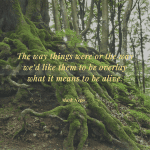This week’s gathering of the International Astronomical Union featured research that says that our universe is slowly dying–fewer stars are being created, existing ones are fading, and the growth of dark energy in the last few billion years has seemed to hasten the process. Don’t panic–many billions of years yet to come for many stars, including our own sun.
But it raises theological questions. What does it mean to live in a cosmos where the best science we have says we appear to be enjoying the Indian Summer of time?
One option is to reject the findings out of hand, to say the research is invalid if it doesn’t match our current model of how things are.
Another take could be acceptance of the transience of all things–not only flowers and guinea pigs, but the whole universe.
My colleague, Ron Robinson, puts forth two possible ways to hear this news. First, he calls our universe “deciduous”–like a tree that loses its leaves and falls dormant, as part of a larger cycle of life. He also wonders if the death of the universe might open way to the multiverse, the birth or manifestation of a more complex, more majestic reality. Some might call it “glory.”
Psalm 90 says, “Lord, you have been our dwelling place in all generations. Before the mountains were brought forth, or ever you had formed the earth and the world, from everlasting to everlasting you are God. You turn us back to dust…For a thousand years in your sight are like yesterday when it is past, or like a watch in the night. You sweep them away; they are like a dream, like grass that is renewed in the morning; in the morning it flourishes and is renewed; in the evening it fades and withers.”
From everlasting to everlasting. Do we live in a meaningless, dead-end process in which the light has already started to fade? Or do we live in a deciduous universe, in which death doesn’t get the final word, but is part of a larger life?
Science says “what”–what can be observed and known about this universe we inhabit. Religion says “so what”–what meaning do we make of what is known and observed? And ethics says “now what”–given what is known, and what we take it to mean, how on earth will we live? Or maybe that’s not ethics. Maybe it’s art.















